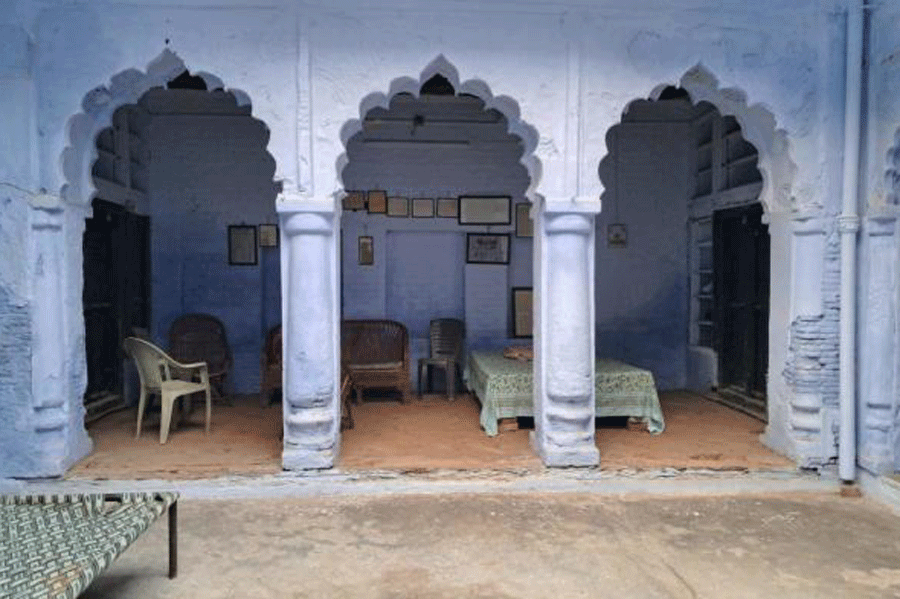Farangi Mahal has down the centuries seen many roads intersect, the Islamic seminary’s colourful history uniting in its sweep the Mughal emperor and the Mahatma, the Khilafat and the Non-Cooperation Movements.
On Thursday, too, all the roads in Lucknow seemed to lead to its neighbourhood — to the Aishbagh Eidgah which Farangi Mahal manages.
Among those gathered were the 30,000-odd faithful, arrived to offer the Eid namaz. Also congregated were politicians of many hues, as different as Aurangzeb from Gandhi, keen to show their face in election season.
Muslims make up 19 to 51 per cent of the voters at the 80 Lok Sabha constituencies in Uttar Pradesh.
Among those marking their presence was Brijesh Pathak, deputy chief minister of Uttar Pradesh, who had two years ago proclaimed that the Shahi Eidgah of Mathura shouldn’t be where it stands because “Muslim invaders broke the Hindu temple (to Krishna) and built a mosque.”
Pathak arrived around the same time as Akhilesh Yadav, president of the Samajwadi Party that boasts the largest and staunchest Muslim vote bank in the state.
So, after the namaz had concluded and sweets were being distributed,
the assembly was witness to the spectacle of Pathak and Akhilesh standing on
the same podium, erected on a corner of the ground, waving to people.
The others who came included state Congress chief Ajay Rai, defence minister Rajnath Singh’s son and Lucknow MP Neeraj Singh, political heavyweight Danish Ali of western Uttar Pradesh, Samajwadi Lok Sabha candidate from Lucknow Ravidas Mehrotra, and BJP member of the legislative council Danish Azad Ansari, who has been assigned to collect the Muslim votes.
Some of the politicians came before the namaz started; some arrived after. A few climbed onto the podium, the rest mingled with the crowd.
Khalid Rashid Farangi Mahali, an imam of the Eidgah mosque whose family runs Farangi Mahal — also known as the Islamic Centre of India, a research hub — sidestepped the question when The Telegraph asked why he thought the politicians were coming.
“We offered sewai to all the visitors,” he said, smiling.
Pathak offered words as sweet: “I wish all the best to all the Muslim brothers and sisters on the occasion of Eid. Our government is continually working for the welfare of the minority community, for the growth of Muslim brothers and sisters.”
He added: “Respected (Narendra) Modiji’s vision is about welfare of all, trust of all….”
After his Eidgah visit, Akhilesh told reporters: “I wish a happy Eid to the people of the state. We celebrate every festival together and that it our syncretic culture…. This Ganga-Jamuni culture enhances our camaraderie. The Constitution of our country, the democracy of our country, are strengthened by this culture.”
This syncretic culture is also reflected in the history of Farangi Mahal, where the idea of joining the Khilafat Movement and the Non-Cooperation Movement was born in the early 1900s.
Maulana Abdul Bari Farangi Mahali, an eminent religious scholar and leader of the Khilafat Movement, ran Farangi Mahal at the time.
It was Mughal emperor Aurangzeb who gave this property, once owned by French merchants, to Abdul Bari’s ancestors over five centuries ago.
Mahatma Gandhi came to stay in Farangi Mahal in 1919 and many more times thereafter. His stamp of approval provided that extra boost to the Khilafat Movement. Among other national leaders who stayed here were Jawaharlal Nehru, Maulana Abul Kalam Azad and Sarojini Naidu.
Akhilesh wrapped up his comments before reporters with a few salvos against the BJP, which he accused of “breaking the people’s hearts”.
Congress leader Rai said: “We believe in inclusive politics and oppose the BJP’s politics of hatred.”
Khalid Rashid Farangi Mahali — a member of the All India Muslim Personal Law Board who had warned the BJP government not to harass Muslims in the name of criminalising the instant triple talaq or introducing a uniform civil code — suggested Muslims have been betrayed but made no direct political comments.
Told that people might connect Thursday’s rush of politicians with the elections, he said: “The people (Muslims) are not much interested in the elections this time because (past) promises were broken. We see such negativity because they acted just opposite to what they said at election rallies.” He did not elaborate on who broke which promises but added: “The Muslim community is suspicious of many things and is looking at every development keenly but silently.”










